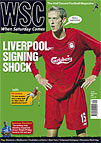 The comprehensive corporate makeover of Austria Salzburg has brought in big money and big promises but has alienated supporters, as Paul Joyce reports
The comprehensive corporate makeover of Austria Salzburg has brought in big money and big promises but has alienated supporters, as Paul Joyce reports
The Austrian Bundesliga has always been highly commercialised. Club names can be altered at the behest of new investors – hence FC Superfund in Pasching, or SCU Seidl Software of Untersiebenbrunn. With players plastered from head to arse in sponsors’ logos like motor-racing drivers, it’s fitting that Red Bull owner Dietrich Mateschitz followed his acquisition of a Formula 1 team with that of SV Austria Salzburg in April.
Mateschitz, whose stake in the energy drink manufacturer has been estimated at $2 billion, aims to establish the 1994 UEFA Cup finalists as a major European force “within three to five years”. Enticing Franz Beckenbauer to Salzburg as an advisor has facilitated the construction of a squad containing former Arsenal goalkeeper Alex Manninger and such experienced internationals as Thomas Linke, Alex Zickler and Vratislav Lokvenc. With a budget of €30 million, last year’s relegation candidates have become this season’s title favourites.
Yet Mateschitz’s brazenness in treating the re-named “Red Bull Salzburg” as a mere marketing instrument for his company has alienated fans. Austria Salzburg’s illustrious history has been airbrushed from the website of the club, which now has a new crest and appears to have been founded in 2005.
More insensitive still was the jettisoning of the violet and white colours in which Salzburg have played since 1933 in favour of red and white (home) and blue (away). Dismissing supporters’ criticism as “kindergarten stuff”, Mateschitz stated: “The red bull can’t be violet, or else we couldn’t call it Red Bull.” In news that may interest his other club, Bayern Munich, Beckenbauer chimed in: “Whether you play in purple, blue or green is irrelevant; the only thing that matters is the team being successful.” New manager Kurt Jara said that any fans who wanted to play in violet should form their own club.
In June, Salzburg fans wearing violet and white were refused entry to a pre-season friendly against Hajduk Split with the words: “The club doesn’t want this.” Although Red Bull blamed local stewards for the incident, they were subsequently identified as being from Salzburg’s own stadium.
In an attempt to create a dialogue with Mateschitz, the pro-violet campaign group Initiative Violett-Weiß urged fans to refrain from anti-Red Bull protests or pitch invasions – as happened at another pre-season match in Mondsee – that could allow the club to portray them as hooligans. Critical fans instead pursued a policy of silent non-support during the first home match of the season against SV Mattersburg on July 20. Not that they had much choice; having already halved the standing capacity of the south stand in which the Salzburg ultras congregated, Red Bull prohibited home fans from taking drums, flags and banners into their Euro 2008 stadium in Wals-Siezenheim.
If the tacky Red Bull graffiti made the ground resemble a skateboard park, the matchday experience itself was like watching a beach volleyball game hosted by Manuel from Fawlty Towers. After a laser show and David Coulthard’s celebrity kick-off, the game was accompanied by verbal and musical exhortations from the stadium announcers. Inspired by the Pamplona bull run, Red Bull “fan animators” dressed in white with red scarves and waist-sashes cajoled the crowd into waving their white bullfighting handkerchiefs – seemingly oblivious to the fact that this gesture indicates disdain in Spanish football.
In the goalless first period, the pro-violet support boycott was so effective that the stadium announcers had to remind their customers that this was meant to be a home match. Yet four unanswered second-half goals for Red Bull were greeted ecstatically by the majority of a capacity crowd of 18,500, many of whom wore the red and white shirts issued free to season-ticket holders. The Initiative Violett-Weiß received much more solidarity from the travelling Mattersburg crew, whose “Stop Mad Cow Disease!” banner was removed by Red Bull stewards.
Mateschitz would, however, be well-advised to consider which sector of his new toy’s fanbase is more likely to travel to away games or to stand by the team once the initial euphoria has subsided. He might also remember that the millions invested in rivals Austria Vienna by the Austro-Canadian industrialist Frank Stronach have not been matched by sporting success, with Stronach’s constant interventions in the club’s affairs causing internal turmoil.
At the Mattersburg match, however, Red Bull’s only compromise to the south stand traditonalists was to issue them with violet-lensed cardboard spectacles.
From WSC 223 September 2005. What was happening this month